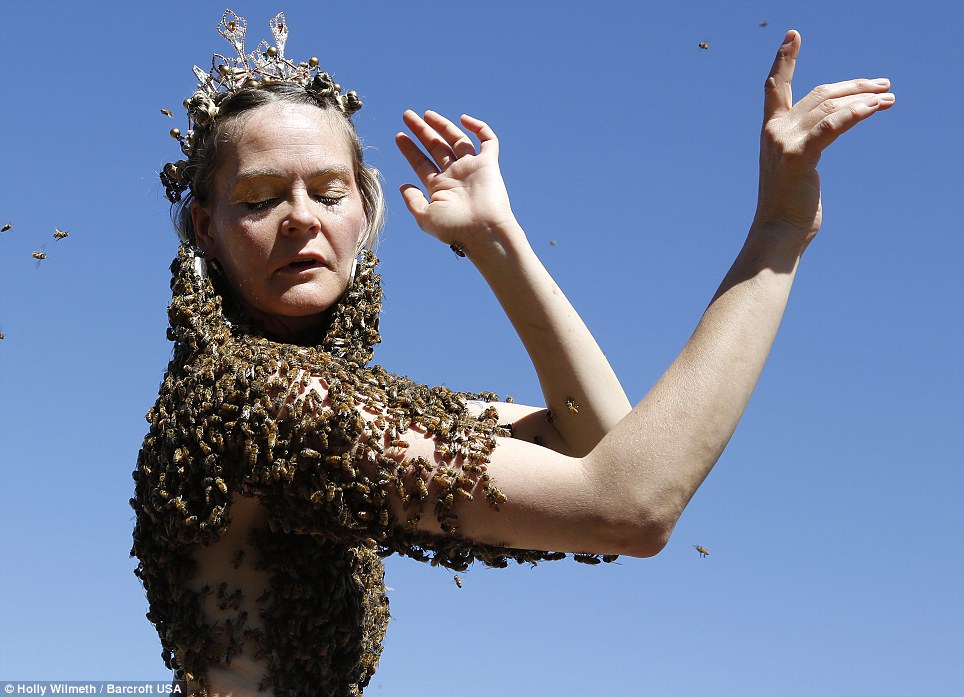The self-proclaimed 'Bee Queen' from Oregon let photographer Holly Wilmeth capture her indulging in her quirky passion, with the close-up shots set to make the hardiest viewer wince.In the images Ms Mapelli is seen calmly wandering around outdoors, with thousands of hairy-bodied insects covering her torso up to her neck, in turn creating a 'natural blouse'.The beekeeper, who also works as an artist and healer, started investigating how her hive would react to her body back in 2001.While they buzz around her she likes to perform a slow 'spiritual' dance, which she says is a form of meditation.On her website, she writes: 'I think of this dance as a duet among many. These 12,000 bees push with their powerful wings from each side of my body, I resist and then I let go and flow and move with them.'It is a deep meditation and I feel the hive mind surround me, hold me, and expand my body on a cellular level.'To get the bees on to her skin she hangs a special pheromone oil around her neck that is equivalent to the scent of 100 queen bees.Once they are attached to her skin, she calmly 'performs' with them for up to two hours at a time.'I really want people to understand that they don't need to fear nature,' she said.Once the bee dance is over, she gets a helper to remove the oil from around her neck and then does a big jump to shake the swarm off.Any remaining 'stingers' are then removed with a soft brush.In videos uploaded to YouTube she warns viewers: 'Do not try this at home.'Indeed, Ms Mapelli has been stung multiple times while dancing.She also says that applying the first layer of bees of bees is extremely painful as they cling on to her armpits, hair, breasts and chin.But she says the pain is worthwhile and hopes that her unusual line of work will help the bees' plight.The U.S. Department of Agriculture reports that the total number of managed honey bee colonies has decreased from 5million in the 1940s to only 2.5million today. From the winter of 2006 to 2011 annual losses averaged about 33 percent each year with causes including viruses, parasites and toxic pesticides used in farming.The winter of 2011 to 2012 was an exception, when total losses dropped to 22per cent.Climate change is also cited as a possible reason for colony decline.If numbers continue to drop, the Department of Agriculture notes that the cost of honey will inevitably increase.On her website Ms Mapelli, who lives with her artist partner, Theodore Holdt, encourages people to grow flowers in a bid to help solve the problem.She concludes: 'Bees also love a bowl of water with large rocks that act as islands during the hot summer months. 'So go outside and beautify your surroundings for the future of us all.'(dailymail.co.uk) ANN.Az
The woman who WEARS 12,000 BEES on her naked chest - PHOTO+VIDEO
World
23:30 | 29.04.2014

The woman who WEARS 12,000 BEES on her naked chest - PHOTO+VIDEO
Stomach-churning photographs show a woman with 12,000 bees crawling on her naked chest. But not to fear, this is something 44-year-old Sara Mapelli likes to do on a regular basis.
Follow us !










